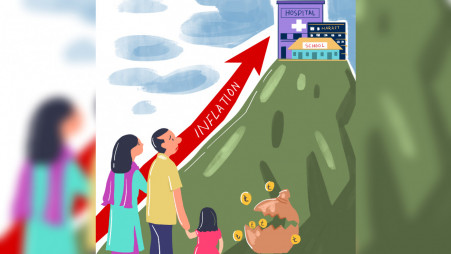Bangladesh grapples with rigid inflation due to absence of policy: BIDS seminar

Inflation in Bangladesh continues to remain high due to a lack of sufficient demand management policies, said Sadiq Ahmed, former chief economist of the World Bank and vice chairman of the Policy Research Institute of Bangladesh.
"Many countries in the world have successfully curbed inflation by implementing demand-reduction policies, such as increasing interest rates," he said while addressing a seminar titled "Four Key Challenges for the National Budget 2023-24: Some Reflections", organised by the Bangladesh Institute of Development Studies (BIDS) at its office on Monday.
To support his point, Sadiq Ahmed said Thailand experienced a significant decrease in inflation, with the rate dropping from 7.7% in June 2022 to 2.2%, a decrease of 65%.
Similarly, the United States witnessed a decline in inflation from 9.1% in June 2022 to 4.9% in April of the current year. Inflation also decreased in Europe, India and Vietnam, he said, adding, however, that in Bangladesh, inflation soared to an 11-year high of 9.94% in May.
Sadiq Ahmed identified four major challenges in next year's budget implementation: restoring macroeconomic stability, revenue mobilisation, financing of the budget deficit and protecting social sector spending.
"A huge deficit and bank-dependent financing plan will increase inflationary pressure. Public borrowing from the central bank creates inflation through monetisation while borrowing from commercial banks will lead to increased production costs by reducing the availability of loans for the private sector," he said.
"FY2023-24 is going to end with a substantially higher rate of inflation than budgeted, significantly lower GDP growth and continued pressure on the balance of payments," said.
The proposed budget for the next fiscal failed to anticipate the depth of the macroeconomic crisis and ended up without securing any sustained progress with macroeconomic stability, Sadiq said.
The economist urged proper utilisation of the fiscal and monetary tools like floating exchange rate, removing the cap on the interest rate, reducing aggregate demand and rationalising budget deficit and showering implementation of the Annual development programme (ADP), particularly the large infrastructure projects.
Moderating the discussion, Dr Binayak Sen, director general of BIDS, said, "We are suffering due to inflation caused by price shocks. The rate of inflation is the highest after 2011 and it is on the way to double digits."
A failure in accelerating economic growth will create some problems regarding unemployment and social protection, he said, urging redistributive initiatives to face such problems.
Dr Kazi Iqbal, a senior research fellow at BIDS, said the upcoming national election is partly responsible for the higher rate of inflation in Bangladesh, unlike other countries.
He suggested increasing the policy strength of the government to intervene in the market as a dominant player to control price level.
Dr Monzur Hossain, research director of BIDS, said over 25% of the depreciation of the taka may contribute a lot to rising inflation in Bangladesh. The government has a provision to reduce advance income tax (AIT), VAT and other indirect taxes on imports to reduce inflationary pressure.
Quazi Shahabuddin, former director general of BIDS, said the tax-to-GDP ratio is historically the lowest in Bangladesh, which is to be increased. A proposal of formulating a tax reforms commission was ignored for several years.
Responding to questions from the audience, Sadiq Ahmed said the government has to reduce the deficit by reducing spending on ADP. A delay of six months or a year for infrastructure will not create major challenges.
He also urged reforms and the establishment of good governance to increase both tax and non-tax revenue.
Total assets of non-financial state-owned enterprises (SOEs) are conservatively estimated at around 20% of GDP and a 10% rate of return on these assets should yield revenue of 2% of GDP, Sadiq Ahmed said.
In reality, SOEs at their peak earned a profit of about 0.4% of GDP. Turning around the performance of the SOEs through corporate governance and pricing reforms could yield an additional 1.6% of GDP as revenues for the government, he said.
The richest 10% of people in the economy occupy roughly 35% of GDP and a 10% effective rate of taxation will ensure income tax collection by 3.5% of GDP, the former World Bank chief economist said.
But direct tax collection in Bangladesh remained at 1.1% of GDP and the government has the potential of generating additional direct tax worth 2.4% of GDP, he added.



 Keep updated, follow The Business Standard's Google news channel
Keep updated, follow The Business Standard's Google news channel
















